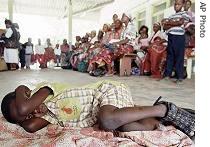2007年VOA标准英语-WHO Says Progress Being Made in Controlling Mal(在线收听)
Geneva
23 April 2007
The World Health Organization says its Roll Back Malaria program is making progress in cutting the number of deaths from this disease. Lisa Schlein reports for VOA from WHO headquarters in Geneva.

A young boy waits his turn to be tested for malaria, in Manhica, Mozambique (File photo)
In many African countries, malaria is the single leading cause of death, with one child dying every 30 seconds. The World Health Organization reports one million people die from malaria every year, 90 percent in Africa. In addition, malaria costs the continent $12 billion in economic losses.
But, the World Health Organization says things are taking a turn for the better.
Executive Director of the WHO Roll Back Malaria Partnership, Awa Marie Coll-Seck, says the first few years of the program were not very successful, but lessons have been learned.
"All partners are proposing the same strategies and are supporting countries in the same way. It is why we are now more successful also at country level," said Coll-Seck. "And capacities of countries also are going better. The capacity building particularly with WHO is helping the countries. This is what I want to say, showing that things are moving in the direction, where we think that we can have results and successes are coming already."
Along with better coordination, the availability of new tools for fighting malaria is having a huge impact on taming the disease.
The World Health Organization says increasingly ineffective malaria medicines have been replaced by a new generation of drugs known as "artemisinin-based combination therapy" that has revolutionized malaria treatment.
WHO Assistant Director General, Hiroki Nakatani, says the new control strategy also includes a more effective way of preventing people from being bitten by the malaria-causing mosquitoes.
"We have bed nets so that mosquitoes cannot bite the most vulnerable population, such as young children and pregnant women," said Nakatani. "And, now we have long-lasting insecticide bed nets, which can work for many years - three to five years. So, we would like to have universal access to such nets."
The World Health Organization also advises indoor spraying to control malaria. The Roll Back Malaria program has also helped increase global funding to fight the disease from about 60-million dollars in 1998 to one-billion dollars per year.
Thanks to support from the Global Fund to fight AIDS, Tuberculosis and Malaria, and other institutions, countries such as Rwanda, Tanzania, Ghana, Zambia and Zanzibar are successfully cutting child deaths from malaria.